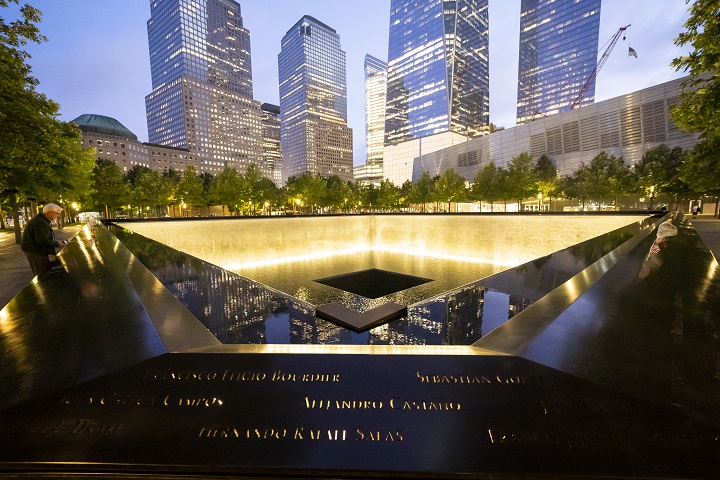Make a donation to the museum
Q&A with Joana Cook, Author of "A Woman's Place: U.S. Counterterrorism Since 9/11"
Q&A with Joana Cook, Author of "A Woman's Place: U.S. Counterterrorism Since 9/11"

The 9/11 Memorial & Museum's winter/spring 2020 fall public programming season kicks off on Monday, February 10, with A Woman's Place: U.S. Counterterrorism Since 9/11. Senior Research Fellow at the International Centre for the Study of Radicalisation Joana Cook will discuss her new book which explores the significant role of women in key U.S. national security agencies.
In the Q&A below, Cook discusses her research, her experience of 9/11, and the role of women in modern counterterrorism efforts.
You can reserve a ticket for next week’s program here or watch a livestream of the program beginning at 7 p.m. on Monday, February 10.
When did you begin to consider the intersections of gender and terrorism/counterterrorism? Did your personal journey in any way influence your desire to write a book on the subject?
Counterterrorism was not an area I looked at extensively at first. I was more interested in cases like Rwanda during the genocide, or particular historical events—especially World War II when I was younger—cases where entire societies had been shaped and changed in dramatic and terrible ways by political violence. What began to jump out very clearly to me was that women were consistently some of the most victimized populations, but they could also be perpetrators of violence, they could be active in forces trying to stop this violence, and they could be key to helping these societies recover following. Yet their stories were often neglected as were the efforts taken to support their diverse roles. As I began to research 9/11 and the subsequent responses to it, I noted the same trend—women’s stories, experiences, perspectives, and diverse roles were often overlooked, and I wanted to change that.
How do women enhance counterterrorism efforts by the U.S.? Can you give an example of what this contribution might look like at home and/or abroad?
I talk about women as agents, partners, and targets in U.S. counterterrorism efforts. That is, women who worked throughout the U.S. government as soldiers, aid workers, diplomats, and others who had a direct role in some aspect of the work being done to prevent extremism and counter terrorism. I talk about partners as local women in Iraq, Afghanistan, Yemen, and others who were directly engaged by the U.S. being trained in foreign forces, or engaged in local communities. I also highlight targets—women who supported or joined al-Qaeda or ISIS. Women’s participation, perspectives, skills, and talents were imperative to engage and consider if practices were to be effective and reflective of the needs and concerns of that population. Also considering women’s roles in terror groups also meant we could better respond to them, preventing their support for such groups, or better support their disengagement. Unfortunately, though, across the board women were consistently a secondary consideration, which led to numerous ineffective practices or understandings of women’s roles in political violence.
Despite an evolution in attitudes since 9/11, is there still work that needs to be done when it comes to women and counterterrorism? Have certain conventions/challenges remained unchanged over the past 10 or 20 years?
There is so much work that must be done in this space, and I hope that the next generation of women can see themselves getting involved in, leading, and shaping security policies and practices going forward. I hope that this can be further supported by diverse partners such as male colleagues who also benefit from women’s participation, and governments who fund and support such efforts. A “woman’s place” is still not fully recognized and encouraged in the field of security and particularly counterterrorism, but issues like terrorism and extremism impact all of us, and women’s diverse roles in relation to this have to be considered and supported at every step. Understandings of gendered dynamics and considerations in counterterrorism and indeed terrorism also continue to fall short.
Have you visited the 9/11 Memorial & Museum previously, and if so, what was your experience?
I watched the Twin Towers go down from my high school classroom in Canada and have had a chance to come visit Ground Zero several times since. It’s always a very somber experience which always drives home the magnitude of the events of that day, and what that’s meant for how international security has evolved over the last almost two decades. It’s a reminder of the importance of continuing to tackle all forms of political violence, whether jihadist, actions of the far right, or others we see coming up today.
By 9/11 Memorial Staff
Previous Post
9/11 Memorial on the Small Screen

In the coming months, the 9/11 Memorial will be featured in several popular television shows. The Memorial plays a different role in each program, but its ongoing presence in the cultural landscape builds public awareness around the 9/11 Memorial & Museum’s mission and demonstrates how this sacred space is an essential part of the fabric of life in New York City.
Next Post
Visitors to Museum Meet Working Dogs, Celebrate Opening of "K-9 Courage"
On Saturday, February 1, the 9/11 Memorial Museum celebrated the opening of the new special exhibition, K-9 Courage, with a family-friendly K-9 festival.